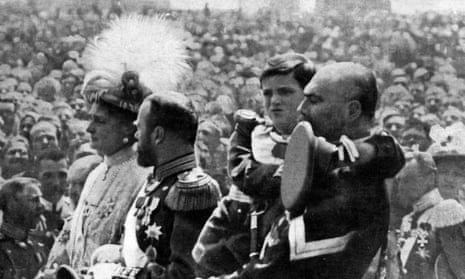One of the most recent publications ". . .For Russia, it has long been Grand Prince Vladimir, who had 800 concubines and wives before choosing Christ over Muhammad at the end of the first millennium for the very Russian reason that Islam did not permit alcohol. In truth, Vladimir (or Volodymyr to the Ukrainians) is a classic founding figure, now a saint, about whom almost nothing is known.
Yet according to President Putin, unveiling a monstrous statue to him in 2016, he “gathered and defended Russia’s lands… by founding a strong, united and centralised state”.
The Story of Russia by Orlando Figes review – Vladimir Putin and the power of myth-making

"The historian’s latest work on Russia is a lucid chronological journey that ably illustrates how narratives from the nation’s past have been used to shape its autocratic present '...
Sun 21 Aug 2022 06.00 EDT
✓✓ In July 2021, Vladimir Putin published his own story of Russia, a 5,000-word essay On the Historical Unity of Russians and Ukrainians, which can now be read as his justification for the invasion he launched seven months later to bring his brother “little Russians” back into the arms of big brother Rus. Reaching back into the mists of myth, he sees the idea of Ukraine as a Trojan horse, an “anti-Russian project” since the 17th century and that the present state is on “historically Russian lands”. As Figes makes clear, anyone with the most elementary grasp of the shape of Europe, from Berlin to the Urals, would know that borders are determined by raw power, not some mystical racial bond. Flip through any historical atlas of the past 1,000 years and states appear, disappear and move around with astonishing but telling regularity. Empress Catherine, a German, may have founded Odessa (Figes interestingly uses Russian spellings for Ukrainian cities) to capture the world’s grain trade in 1794. But just years before that, the Black Sea coast had been part of the Polish Lithuanian commonwealth.
✓
The Story of Russia by Orlando Figes — the past that shapes Putin’s rule
by Orlando Figes ‧ RELEASE DATE: Sept. 20, 2022
An expert on Russia delivers a crucially relevant study of a country that has been continuously “subjected to the vicissitudes of ruling ideologies.”
Wolfson History Prize winner Figes, one of the world’s leading authorities on Russian history and culture, shows how, over centuries, Russian autocrats have manipulated intertwined layers of mythology and history to suit their political and imperial purposes. Regarding current affairs, the author argues convincingly that to understand Putin’s aggressive behavior toward Ukraine and other neighboring nations, it is essential to grasp how Russia has come to see itself within the global order, especially in Asia and Europe. Figes emphasizes the intensive push and pull between concepts of East and West since the dubious founding of Kievan Rus, “the first Russian state,” circa 980. Russia’s geography meant it had few natural boundaries and was vulnerable to invasion—e.g., by the Mongols—and its mere size often required strong, central military control. It was in Moscow’s interests to increase its territorial boundaries and keep its neighbors weak, a strategy still seen today. Figes explores the growth of the “patrimonial autocracy” and examines how much of the mechanics of the country’s autocracy, bureaucracy, military structure, oligarchy, and corruption were inherited from three centuries of Mongol rule. From Peter the Great to Catherine the Great to Alexander II (the reformer who freed the serfs) and through the Bolsheviks to Stalin: In most cases, everything belonged to the state, and there were few societal institutions to check that power. “This imbalance—between a dominating state and a weak society—has shaped the course of Russian history,” writes the author in a meaningful, definitive statement. Today, Putin repudiates any hint of Westernizing influences (Peter the Great) while elevating the Eastern (Kievan Rus, the Orthodox Church). In that, he is reminiscent of Stalin, who recognized the need for patriotic fervor and national myths and symbols to unite and ensure the oppression of the masses.
A lucid, astute text that unpacks the myths of Russian history to help explain present-day motivations and actions.
Pub Date: Sept. 20, 2022
ISBN: 978-1-2507-9689-9
Page Count: 352
Publisher: Metropolitan/Henry Holt
Review Posted Online: June 8, 2022
Kirkus Reviews Issue: July 1, 2022
✓
.jpg)

.jpg)
.jpg)

No comments:
Post a Comment